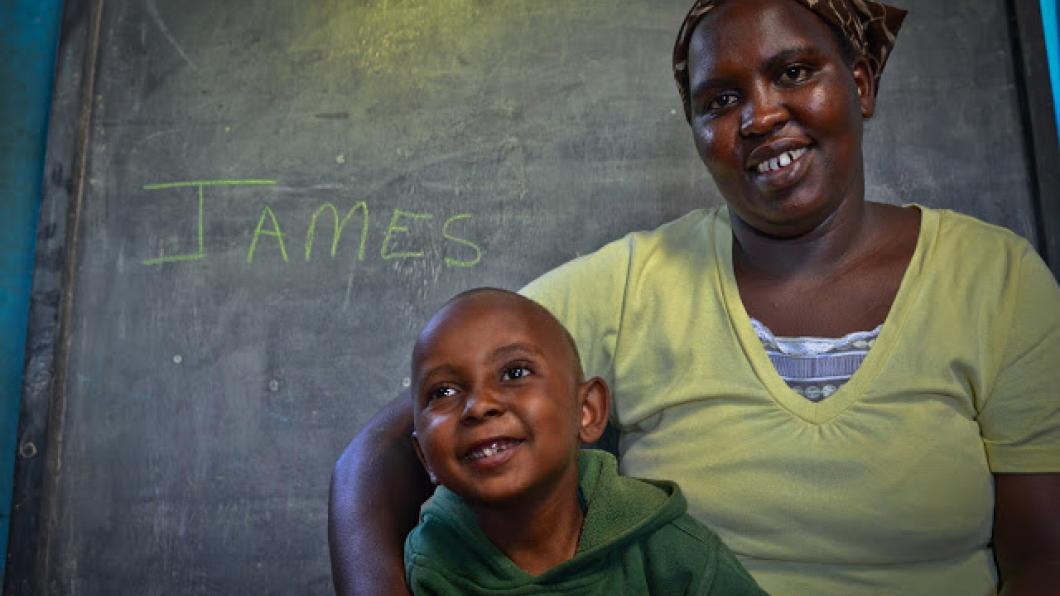
'We laugh, we encourage each other, and there's no judging'
Photos by Chelsea Dee
By Louise Kinross
In 2013, BLOOM covered a unique sewing project in Maai Mahiu, northwest of Nairobi, that was changing the lives of Kenyan mothers of children with disabilities. The program—then called Malaika Mums—is still flourishing and is now called Ubuntu Made. Ubuntu is an African philosophy meaning “I am because we are.” Mothers in the program make cotton bags, reusable coffee sleeves and beaded bracelets that are sold to provide them with income and support their children in an onsite school. We recently brought you an update. Now we interview Teresia Mugure (photo above, with son James, who is nine). James has attended the school for six years.
BLOOM: Tell us about your child.
Teresia Mugure: Jimmy, as he is fondly called by everyone, is a very joyful, happy, [active] and a very playful boy. He has intellectual disability and hyperactivity and is partially deaf. He also had delayed milestones like walking. He enjoys playing with other children.
BLOOM: How does Jimmy communicate?
Teresia Mugure: He communicates with sign language—by pointing to things or taking your hand and showing you what he wants—body language and facial expressions. Hearing aids help him hear at a high pitch.
BLOOM: How is disability viewed in Kenya?
Teresia Mugure: The common myth is that disability is a curse because the mother, or another family member, did something bad.
BLOOM: How did you feel when you learned Jimmy had disabilities?
Teresia Mugure: Sad, confused and lost.
BLOOM: What impact did Jimmy’s disabilities have on your family?
Teresia Mugure: Initially it had a negative impact, especially from family and friends. They didn’t know anything about disability, so it was a shocker for most of them. Then there were the myths associated with disability.
But right now, we are well informed about his condition and how to manage it. Now they all love Jimmy and have learned that disability is not a curse. I have accepted my child as he is and am happy to have him. I enjoy spending time with him. He keeps me alert and I’ve learned so much about life just by having him.
BLOOM: What would have happened if you weren’t able to get work at Ubuntu Made, and for Jimmy to go to their special needs school?
Teresia Mugure: I just don’t know. Maybe I could have been homeless. But God is faithful and I have a job. When Jimmy joined at age three, he was not able to walk or do anything for himself. Without Ubuntu, my child would have never learned how to walk, and maybe his condition would have gotten worse.
BLOOM: I understand some fathers there are unable to accept their child’s disability. Is Jimmy’s father involved in his life?
Teresia Mugure: Yes, his name is Solomon and he is very supportive to the family and tries his best to support me to raise our two children. I also have another son who is 17 years old and completed his secondary education last year.
BLOOM: Do you like working with other mothers who also have children with disabilities?
Teresia Mugure: Yes. We understand each other better and through psychosocial support sessions we laugh, we encourage one another and there's no judging.
BLOOM: What is your favourite part of your job?
Teresia Mugure:Sewing. I like being on the machine and stitching. When I see the end product I’m always proud of myself. At times I cry when I have a flashback and see where we started, and where we are now. All I can say is ‘Thank you Lord.’
BLOOM:How has having a job changed things for your family?
Teresia Mugure: Working at Ubuntu Made has been positive. I’m able to take care of Jimmy and provide the best care possible. I can provide food, shelter, education and clothing. I’m a proud mother. I’ve earned respect in the community, among relatives and the general public.
BLOOM: What have you learned since being part of the program?
Teresia Mugure: I’ve learned to appreciate life and the importance of working as a team, family values, and caring for and loving my child.
BLOOM: How is Jimmy doing in the Ubuntu kids’ program?
Teresia Mugure: I have seen a total transformation in my boy. When he joined, he was not able to walk or do anything for himself. Right now he is the most active child in the program.
I am forever grateful and thankful to the staff who have journeyed with me. I’m at a loss for words. I will never be able to repay them for the services received.
BLOOM: What advice would you give to other mothers who live in places where disabled children are not accepted?
Teresia Mugure: Disability is not a life sentence and it is very manageable. I would ask organizations working in the field to try to reach and educate as many mothers as possible. There are a lot of false myths associated with disability in Kenya and Africa in general.
BLOOM: What are your dreams for the future?
Teresia Mugure: My dreams? Grow in my job, invest and be able to take care of my family. I’m too old to go back to school, but I have gained skills since I jointed Ubuntu. I’d like to talk to other mothers raising children with special needs.
